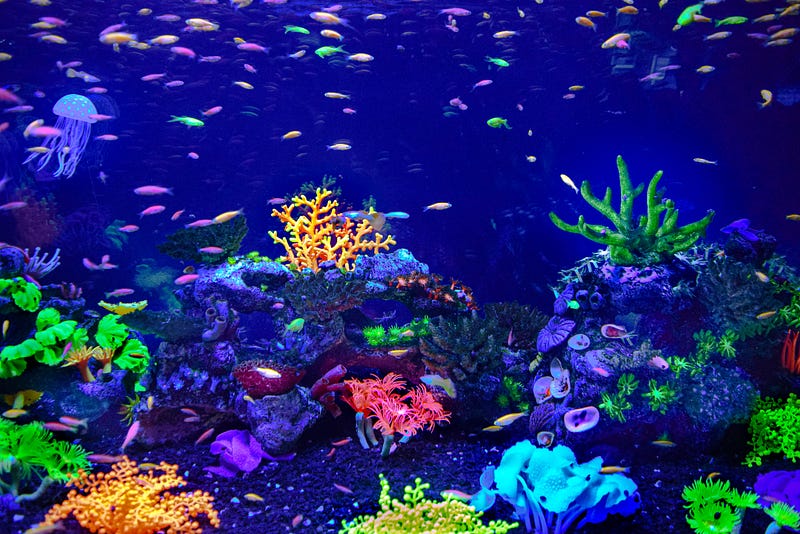# Introducing Dr. Charlie Veron: A Beacon of Hope for Our Planet
Written on
Chapter 1: A Troubling Outlook
Recently, I've encountered three different scientists over the span of just a few days, and none of them seem particularly optimistic about the future of our planet. Last night, Dr. Charlie Veron took center stage on ABC television.
Interestingly, “Charlie” isn’t his birth name; it was a moniker given by a teacher due to his remarkable similarities to Charles Darwin. This name has stuck with him over the years. Residing in Queensland, Charlie continues to push forward, but he’s far from ready to retire.
Dr. Veron is often described as a "human fish," as he feels most alive submerged in water. He would remain underwater indefinitely if he didn’t need to surface for air. For him, the ocean is a vibrant garden filled with life.
For the past 50 years, Charlie has explored coral reefs, constantly observing and learning. He marvels at the endless discoveries he makes with each dive: “Every time I go down, I see something new. It’s truly limitless.”
Despite not excelling in school—he even repeated his final year—Charlie eventually took an IQ test at his father's urging, revealing his genius. This led to a scholarship and ultimately a PhD. Today, he stands alongside renowned environmentalists like David Attenborough in his field.
Both experts, though specialized in different areas, understand the critical interconnections of life on Earth. Charlie feels most at home beneath the waves, where he describes a living reef as “incredibly loud,” full of communication among marine creatures, akin to a bustling city.
“I find the night especially enchanting,” he shares. “When I turn off my torch and sit on the ocean floor under the bright Moon, everything transforms into silver and grey. It’s pure beauty.”
While I can hardly fathom sitting alone at the ocean's bottom without feeling isolated, for Charlie, it is where he reflects, observes, and dreams of a better future.
Chapter 2: The State of the Great Barrier Reef
Reflecting on his experiences, Charlie tells us that nearly fifty years ago, the Great Barrier Reef was brimming with life. He recalls his first dives in 1972 as “otherworldly,” but sadly, that is no longer the case in many areas, which now sit in eerie silence.
For someone whose life and career are intertwined with the ocean's health, it can be disheartening to face its decline. However, Charlie chooses to be a source of hope rather than succumb to despair. Just a few years ago, in his seventies, he participated in an expedition across the remote northern Great Barrier Reef, spanning 1,000 kilometers from Port Douglas to Cape York. Despite witnessing vast stretches of dead coral, they stumbled upon a thriving coral garden.
To Charlie, this discovery symbolized hope and a call to action. It reminded him that there is still work to be done, and time is of the essence if we are to preserve what remains.
Now, at 77, rather than taking it easy, Charlie has taken on the ambitious task of collecting one of every coral species from the Great Barrier Reef to establish a “coral ark.”
“These specimens can be utilized to restore the reefs once we have the necessary technology,” he asserts. “There’s no alternative plan; if we don’t act, it will be too late.”
Currently, the Australian government hesitates to implement measures to combat global warming or minimize harmful industrial waste that threatens coral ecosystems. They should advocate for actionable strategies at the upcoming UN Climate Change Conference, labeled as “the world’s best last chance” to manage the climate crisis.
Unfortunately, our Prime Minister may choose to skip this vital gathering, despite the urgency underscored by Charlie’s recent narrative.
Climate change poses the greatest threat to the reef. Elevated water temperatures disrupt the symbiotic relationship between coral and algae, leading to bleaching. The latest report from the Intergovernmental Panel on Climate Change (IPCC) warns that coral reefs globally could be largely destroyed with a mere 1.5-degree Celsius temperature increase, which could occur as early as 2035.
This urgency amplifies the importance of preserving the biodiversity of the Great Barrier Reef. If corals can be kept alive in controlled environments, they won’t be lost forever.
Time is of the essence for both the planet and Charlie, who remains tirelessly dedicated to his mission. His days are filled with overseeing the coral ark, documenting his life's work, and planting thousands of trees to create a wildlife corridor that connects his property to a nearby World Heritage area.
He is a true inspiration! While he may not witness the fruition of his efforts, the long-term benefits require steadfast commitment that spans generations.
What can we do to support Charlie in his mission? Are you prepared to step up like he has, regardless of your age?
Share your thoughts and ideas for Charlie below!
